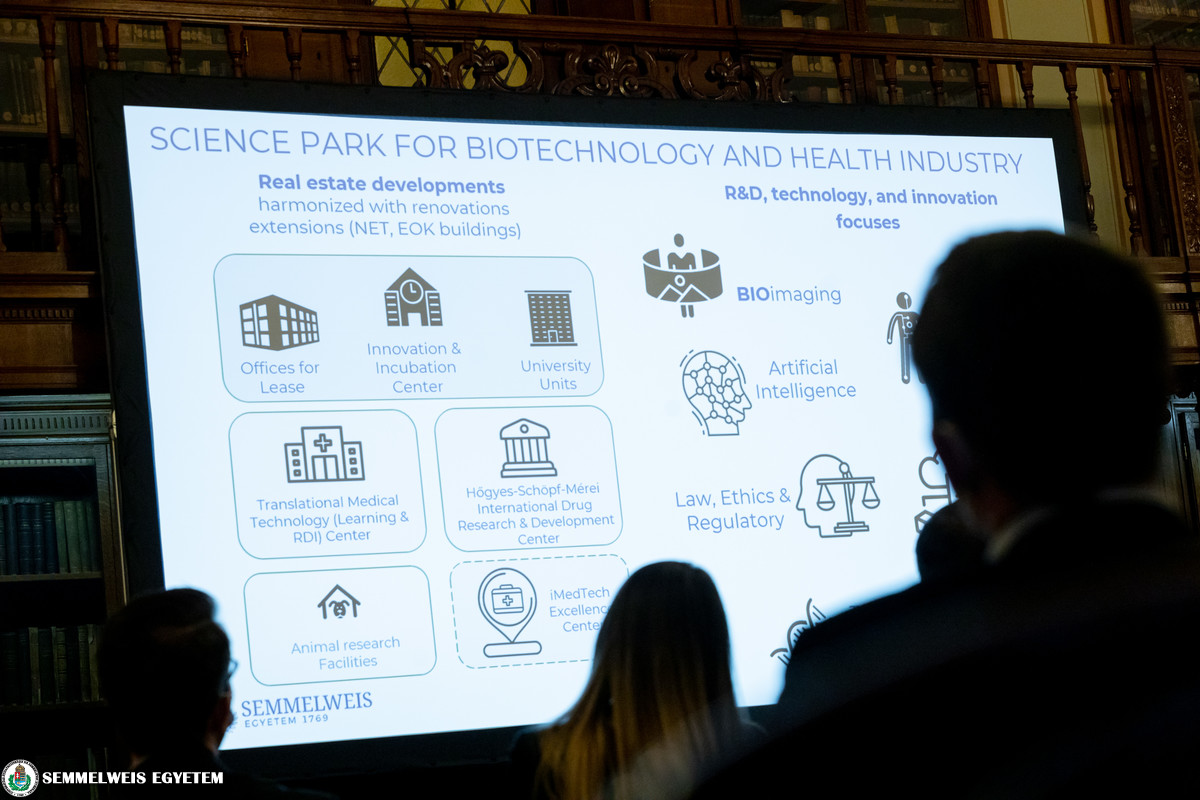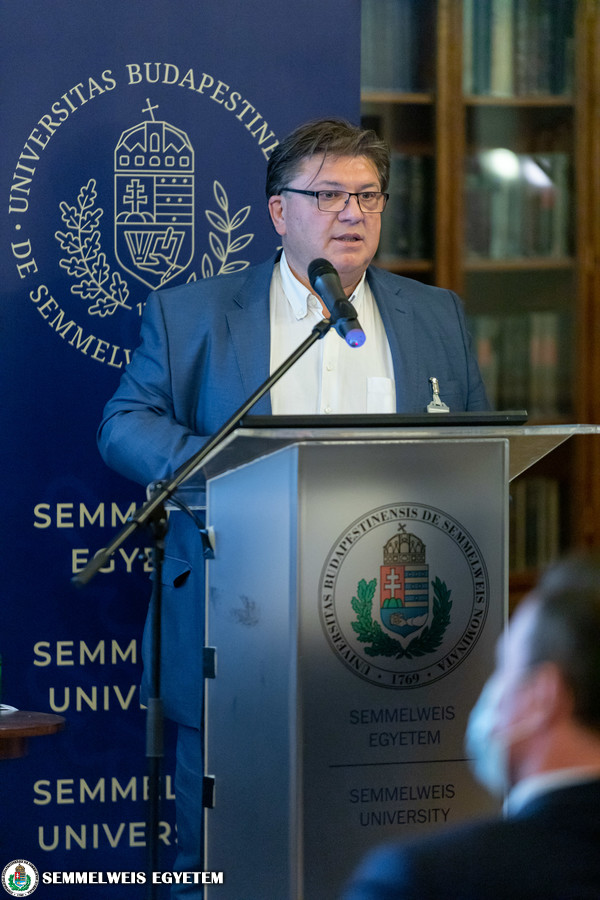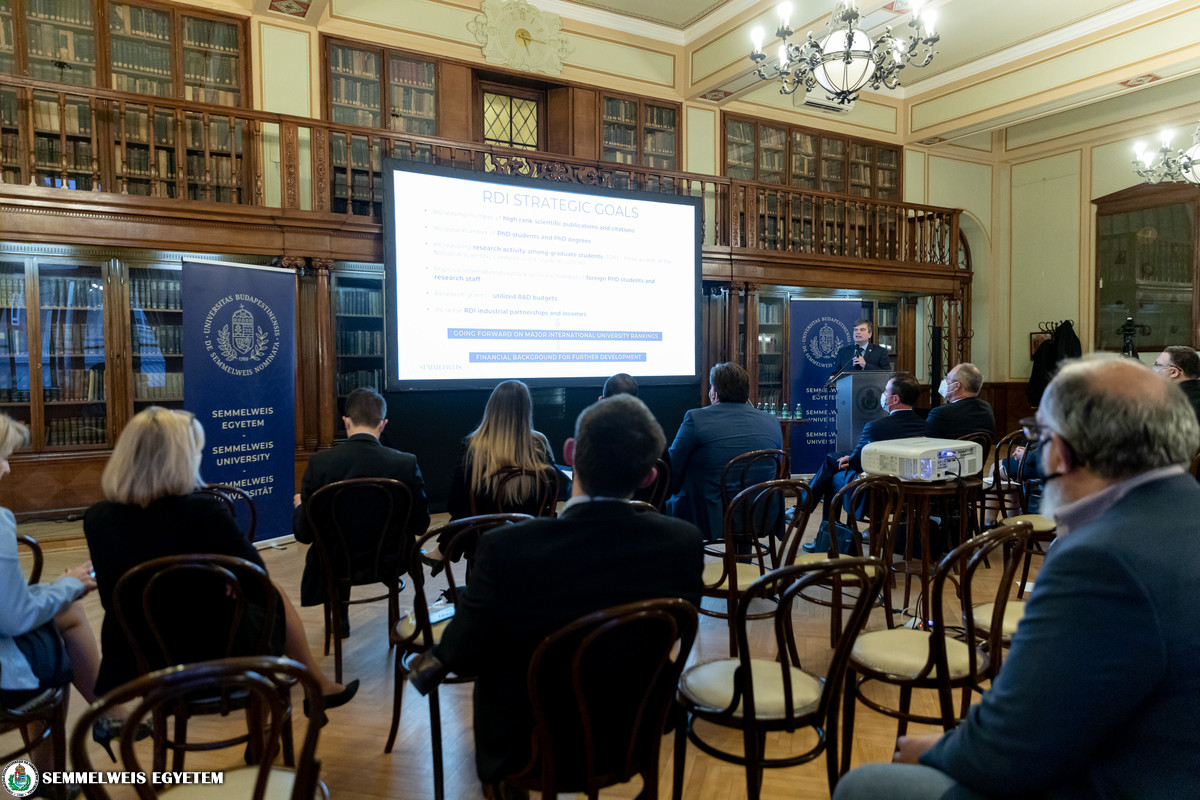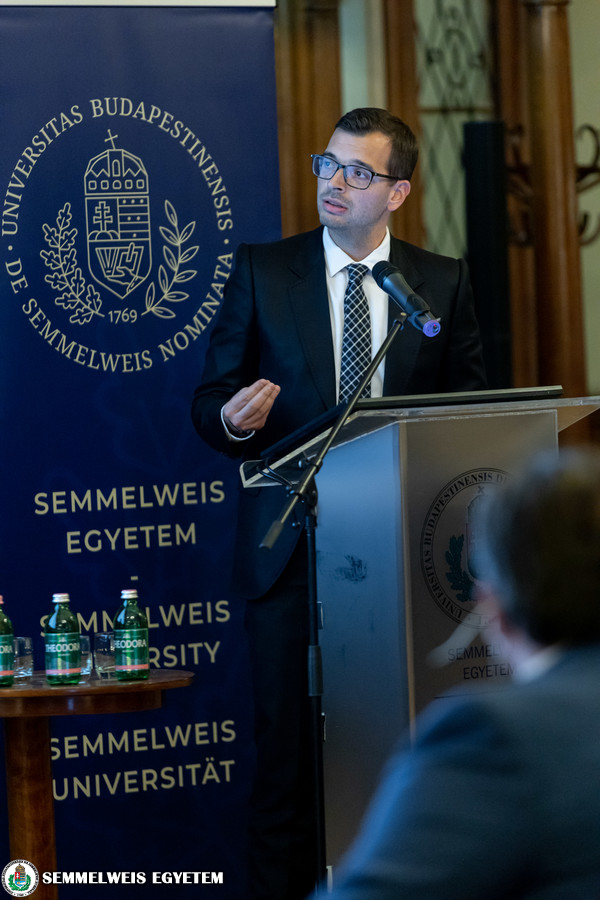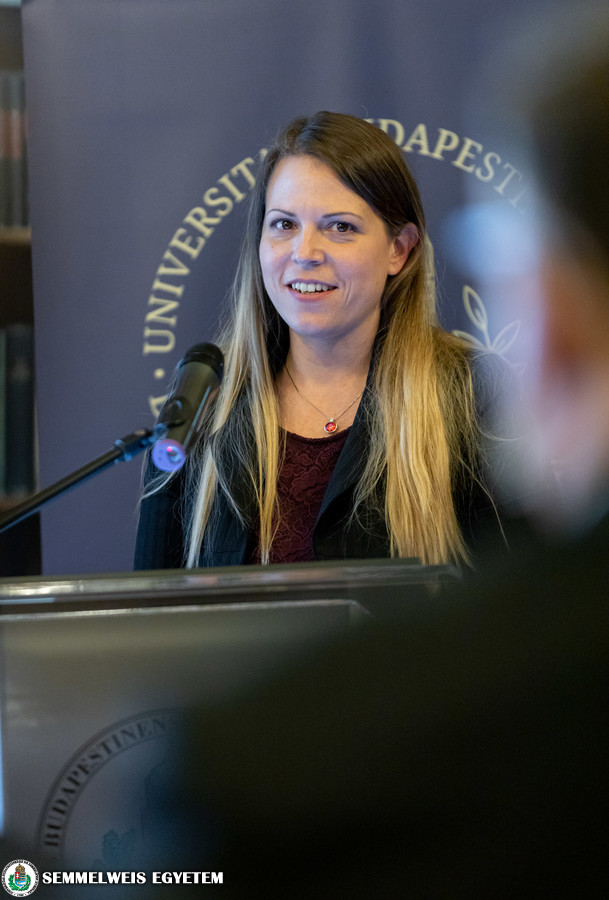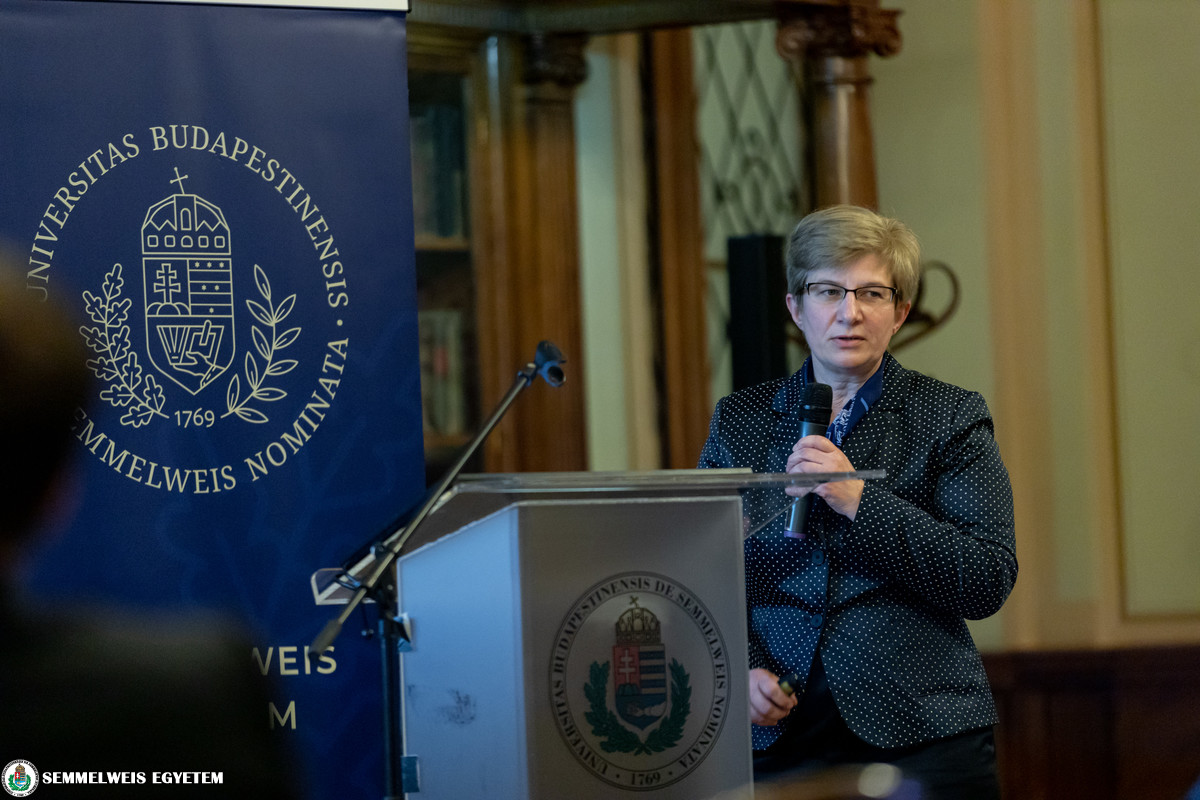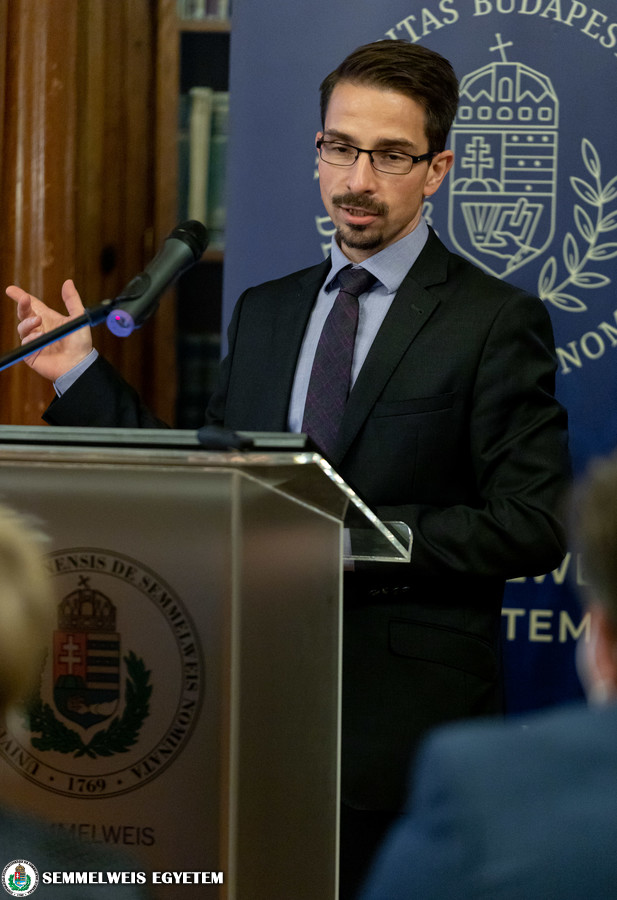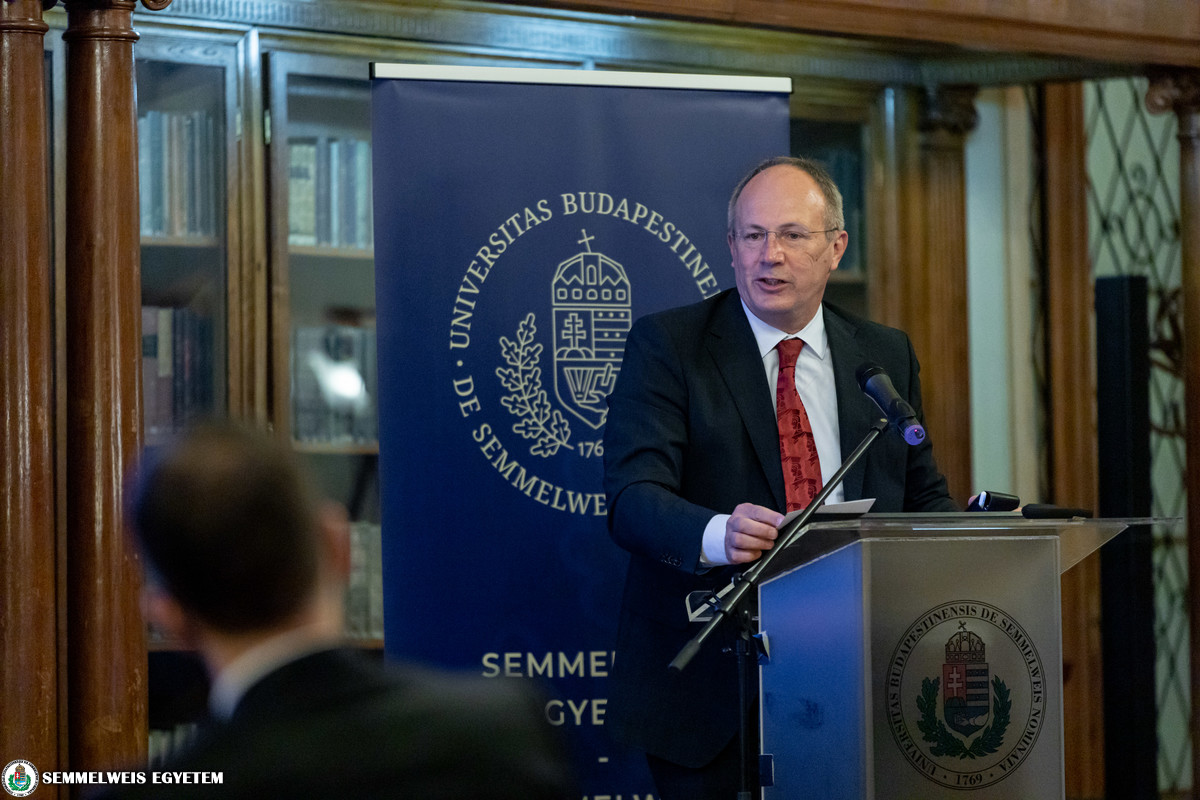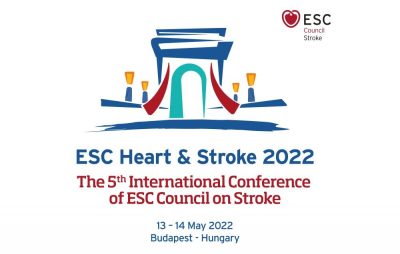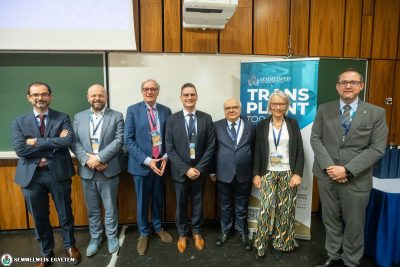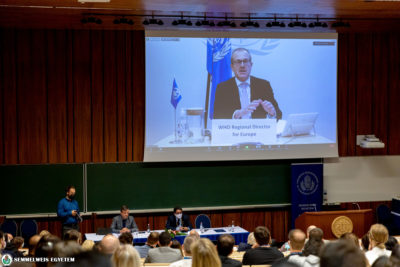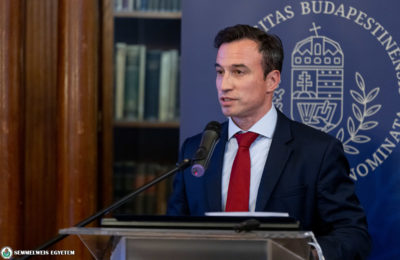 “It gives me great pleasure to be the patron of the Semmelweis Business Forum, which I hope will be very useful not only for Semmelweis University, but also for the wider ecosystem around it, including industry players, businesses, startups and knowledge centers, who, through their cooperation, can help the university to achieve one of its main goals: to be among the top 100 universities in the world,” said Gábor Orbán, chairman of the National Foundation for Health and Medical Education, the university’s operator, and CEO of drug company Richter Gedeon Nyrt. In his speech, he pointed out that the theme of the first evening, health data utilization, is a very good starting point for dialog between industry and university researchers, scientists and clinicians. He noted that in medical sciences, real, empirical data collected through randomized controlled clinical trials enable evidence-based medicine. “Today, we have much more data than before – digital biomarkers, genetic information, patient registries – but to filter out the noise, we need to use statistical and machine learning approaches and integrate different data sets. This is why we need more collaboration between the players in the sector, which we hope this event will be a good opportunity for,” said Gábor Orbán.
“It gives me great pleasure to be the patron of the Semmelweis Business Forum, which I hope will be very useful not only for Semmelweis University, but also for the wider ecosystem around it, including industry players, businesses, startups and knowledge centers, who, through their cooperation, can help the university to achieve one of its main goals: to be among the top 100 universities in the world,” said Gábor Orbán, chairman of the National Foundation for Health and Medical Education, the university’s operator, and CEO of drug company Richter Gedeon Nyrt. In his speech, he pointed out that the theme of the first evening, health data utilization, is a very good starting point for dialog between industry and university researchers, scientists and clinicians. He noted that in medical sciences, real, empirical data collected through randomized controlled clinical trials enable evidence-based medicine. “Today, we have much more data than before – digital biomarkers, genetic information, patient registries – but to filter out the noise, we need to use statistical and machine learning approaches and integrate different data sets. This is why we need more collaboration between the players in the sector, which we hope this event will be a good opportunity for,” said Gábor Orbán.
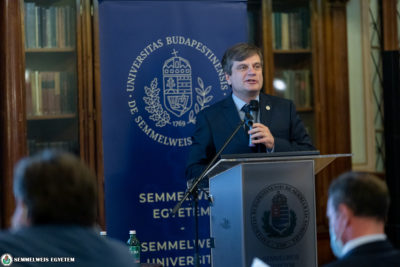 In his presentation, Dr. Péter Ferdinandy, Vice-Rector for Science and Innovation, introduced the changes implemented or planned in the research-development and innovation (RDI) organization of Semmelweis University. The university’s strategic objectives include increasing the number of scientific publications, the number of PhD students and the more efficient use of funding, which has led to the need for a new RDI support system. “Fortunately, what is needed to move up in the international rankings is identical to what is needed to provide a stable financial background for further development,” the vice-rector pointed out. He said that four areas of activity have been identified within the university (non-clinical research, animal studies, investigator-initiated and sponsored clinical trials) that will receive centralized support under the new system, in areas such as quality assurance, biostatistics, database management and business development consultancy. “The final system is currently in the planning stage, and we are looking for input from external partners among others, and this forum today is also part of that process,” said Dr. Ferdinandy. He also highlighted the Science Park as a flagship RDI project of the university, which aims to become a key player in the health industry of the whole region, facilitating the creation of university spinoff companies.
In his presentation, Dr. Péter Ferdinandy, Vice-Rector for Science and Innovation, introduced the changes implemented or planned in the research-development and innovation (RDI) organization of Semmelweis University. The university’s strategic objectives include increasing the number of scientific publications, the number of PhD students and the more efficient use of funding, which has led to the need for a new RDI support system. “Fortunately, what is needed to move up in the international rankings is identical to what is needed to provide a stable financial background for further development,” the vice-rector pointed out. He said that four areas of activity have been identified within the university (non-clinical research, animal studies, investigator-initiated and sponsored clinical trials) that will receive centralized support under the new system, in areas such as quality assurance, biostatistics, database management and business development consultancy. “The final system is currently in the planning stage, and we are looking for input from external partners among others, and this forum today is also part of that process,” said Dr. Ferdinandy. He also highlighted the Science Park as a flagship RDI project of the university, which aims to become a key player in the health industry of the whole region, facilitating the creation of university spinoff companies.
Dr. István Szabó, director of the university’s newly established RDI Business Development Center, spoke about the objectives and planned structure of the unit. He said that it will be responsible for completing the university’s portfolio of RDI products and services, and for initiating and concluding cooperation and sales contracts. It will also identify industrial players and investors interested in the portfolio and support the other units of the university by providing competitive market analyses and financial modelling. This year, the core organization of the unit is being set up, with operational activities to start next year.
Our strategic goal is to create and support around 100 spinoff companies by 2030, and my role, in simple terms, is to sell excellence
– Dr. István Szabó pointed out. He also outlined future plans for the Business Forum series, which will be held quarterly: the biobank will be the main topic in February, the RDI core facilities in April and likely the Science Park investment next autumn.
In the second part of the Business Forum, the regional director of IQVIA, a leading health care data science company, shared his insights on the future of data utilization. According to Luka Chichov, government organizations sit on a wealth of data which is often unstructured, inaccessible or simply not standardized. Stakeholders need to transform these into insights. They must leverage data and technology, in order to manage and analyze them in a rapid, low-cost fashion, he said. The director added that due to technology and affordability, the use of genomic data is rising steadily, which is a critical element to transform clinical research and health care delivery.
Assessing the current projects Judit Somogyi-Rózner, associate director of IQVIA, reminded that creating evidence and utilization of data, experts need standard and harmonized Real World Data (RWD) in a network. Better health decisions, outcome and care is through a new paradigm in the discovery and analysis of health data, she said. Somogyi-Rózner spoke highly of the OHDSI program, which enhances the value of health data through large-scale analytics in over 70 countries, including Hungary. Within that framework, EHDEN is a promising initiative which aims to create a European network for health data science, with Semmelweis University and the University of Pécs being part of it.
Dr. Renáta Papp, Head of the Office of the Vice-Rector for Science and Innovation, agreed with her colleague on the importance of data transformation. Semmelweis University’s database has its strengths that enables to conduct targeted translational research or widen virtual clinical trials, however it has its weaknesses as well, like multiple data entry platforms, software or no dedicated database management center, explained Dr. Papp. As for current projects, she highlighted COVIDATA-S, which represents an impressive set of high-quality data. Three sources are being integrated here: the eMedSol system, paper-based patient records, and a depersonalized database of the National Health Fund Management. The project is at its halfway mark; further steps include a Biobank Network Database, designating a responsible organization and developing a state-of-the-art hospital information system at Semmelweis, Dr. Papp said.
The last presenter depicted the problematic nature of personal data management. Bálint Halász, a partner at Bird & Bird law firm explained: absolute anonymity is no longer possible. The moment a certain data has the chance of identification, it must be treated as personal data, thus subject to the GDPR. This is becoming ‘the law of everything’; a regulation that is well-meant but impossible to maintain, said Bálint Halász. However, he described the threshold of identifiability as “a moving target”, which could make room for alternative approaches concerning consumer protection law, competition law or civil law.
Tamás Deme, Viktória Kiss
Photo: Attila Kovács – Semmelweis University
